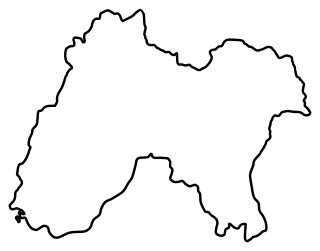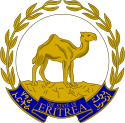
Eritrea is an ancient name, associated in the past with its Greek form Erythraia, Ἐρυθραία, and its derived Latin form Erythræa. This name relates to that of the Red Sea, then called the Erythræan Sea, from the Greek for "red", ἐρυθρός, erythros. But earlier Eritrea was called Mdre Bahri. The Italians created the colony of Eritrea in the 19th century around Asmara and named it with its current name. After World War II, Eritrea annexed to Ethiopia. Following the communist Ethiopian government's defeat in 1991 by the coalition created by armed groups notably the EPLF, Eritrea declared its independence. Eritrea officially celebrated its 1st anniversary of independence on May 24, 1993.

The politics of Eritrea and the government of Eritrea take place in the framework of a single-party presidential republican totalitarian dictatorship. The President officially serves as both head of state and head of government. The People's Front for Democracy and Justice is the only political party legally permitted to exist in Eritrea. The popularly elected National Assembly of 150 seats, formed in 1993 shortly after independence from Ethiopia, elected the current president, Isaias Afwerki. There have been no general elections since its official independence in 1993. A new constitution was drafted in 1993 and ratified in 1997, but has not been implemented. Since the National Assembly last met in January 2002, president Afwerki has exercised the powers of both the executive and legislative branches of government.

Isaias Afwerki is an Eritrean politician and partisan who has been the first and only president of Eritrea since 1993. In addition to being president, Isaias has been the chairman of Eritrea's sole legal political party, the People's Front for Democracy and Justice (PFDJ).

Since its establishment in 1947, Pakistan has had a non-symmetric federal government and is a federal parliamentary democratic republic. At the national level, the people of Pakistan elect a bicameral legislature, the Parliament of Pakistan. The parliament consists of a lower house called the National Assembly, which is elected directly via first-past-the-post voting, and an upper house called the Senate, whose members are chosen by elected provincial legislators. The head of government, the Prime Minister, is elected by the majority members of the National Assembly and the head of state, the President, is elected by the Electoral College, which consists of both houses of Parliament together with the four provincial assemblies. In addition to the national parliament and the provincial assemblies, Pakistan also has more than five thousand elected local governments.

The Eritrean Liberation Front, colloquially known as Jebha, was the main independence movement in Eritrea which sought Eritrea's independence from Ethiopia during the 1960s and the early 1970s.

The Beja Congress is a political group comprising several ethnic entities, most prominently the Beja, of eastern Sudan. It was founded in 1957 by Dr. Taha Osman Bileya together with a group of Beja intellectuals, as a political platform for the politically and economically marginalized Beja people. According to the "Black Book", an analysis of Sudanese regional political representation published underground in the late 1990s by Darfur Islamist followers of Hassan al-Turabi, eastern Sudan has been conspicuous since its independence for its political and economic marginalization. This part of Sudan had fewer ministers and representatives than other parts of the country in the civil and military branches of the central government, as well as having among the lowest rates of education and access to health services in the country.

The Eritrean War of Independence was an armed conflict and insurgency aimed at achieving self-determination and independence for Eritrea from Ethiopian rule. Starting in 1961, Eritrean insurgents engaged in guerrilla warfare to liberate Eritrea Province from the control of the Ethiopian Empire under Haile Selassie and later the Derg under Mengistu. Their efforts ultimately succeeded in 1991 with the fall of the Derg regime.

The National Assembly of the State of Eritrea has 150 members, 75 members appointed and 75 members representing the members of the Central Committee of the People's Front for Democracy and Justice (PFDJ), the sole legal political party of Eritrea. According to the IPU, the National Assembly has 150 indirectly elected members. The National Assembly was composed in 1994, and its meeting place is located in Asmara.

Ibrahim Sultan Ali was born in Keren, Eritrea. He played a part in the emancipation of Tigre in Sahel and Barka and in establishing Blocco Independenza. He was also the Secretary General of the Eritrean Democratic Front (EDF).
Articles related to Eritrea include:

The Ethiopian–Eritrean Federation was a coalition between the former Italian colony of Eritrea and the Ethiopian Empire. It was established as a result of the renunciation of Italy’s rights and titles to territorial possessions in Africa, inclusive of all its established territories or colonies made effective by the Treaty of Paris of 1947. The fate of Eritrea was contingent on numerous political, social, and economic ideals of Eritreans that ranged from leftists favoring independence, conservatives favoring Ethiopian crown rule, and Eritreans who favored a political union of the two sides of the spectrum. In an attempt to provide Eritrea with ultimate autonomy under an Eritrean curated constitution and governmental elections, UN Resolution 390 (A) was devised to implement such welfare to the individuals it was to be imposed upon.

Eritrea, officially the State of Eritrea, is a country in the Horn of Africa region of Eastern Africa, with its capital and largest city being Asmara. It is bordered by Ethiopia in the south, Sudan in the west, and Djibouti in the southeast. The northeastern and eastern parts of Eritrea have an extensive coastline along the Red Sea. The nation has a total area of approximately 117,600 km2 (45,406 sq mi), and includes the Dahlak Archipelago and several of the Hanish Islands.

The 2011 Northern Ireland Assembly election took place on Thursday, 5 May, following the dissolution of the Northern Ireland Assembly at midnight on 24 March 2011. It was the fourth election to take place since the devolved assembly was established in 1998.
The Independent Moslem League, sometimes referred to as the Independent Moslem League of Massawa, was a political party in Eritrea. It was formed through a split in the Moslem League, founded by Moslem League members from the central and eastern provinces of Eritrea. Mohammed Omer Cadi was the president of the party.

Italian Eritrea was a colony of the Kingdom of Italy in the territory of present-day Eritrea. The first Italian establishment in the area was the purchase of Assab by the Rubattino Shipping Company in 1869, which came under government control in 1882. Occupation of Massawa in 1885 and the subsequent expansion of territory would gradually engulf the region and in 1889 the Ethiopian Empire recognized the Italian possession in the Treaty of Wuchale. In 1890 the Colony of Eritrea was officially founded.

Elections to the Legislative Assembly of the Indian state of Hyderabad were held and Sri Burgula Rama Krishna Rao took oath as First Chief Minister of Hyderabad State on 6 March 1952. 564 candidates competed for the 175 seats in the Assembly. There were 33 two-member constituencies and 109 constituencies single-member constituencies.
The Eritrea for Eritreans Party, also known as the Liberal Progressive Party (LPP) was a political party in Eritrea. The party was founded on February 18, 1947 in Adi Keyh. It was a secular party dominated by Christians. It opposed union with Ethiopia. The party program accepted the notion of a U.S. trusteeship as intermediary step towards independence. The party gathered a membership of 53,500.

Assembly elections were held in Eritrea on 5 and 6 September 1956. All candidates ran as independents.

Elections to the Punjab Provincial Assembly were held in January 1946 as part of the 1946 Indian provincial elections.

The fallof the Derg was a military campaign that resulted in the defeat of the ruling Marxist–Leninist military junta, the Derg, by the rebel coalition Ethiopian People's Revolutionary Democratic Front (EPRDF) on 28 May 1991 in Addis Ababa, ending the Ethiopian Civil War. The Derg took power after deposing Emperor Haile Selassie and the Solomonic dynasty, an imperial dynasty of Ethiopia that began in 1270. The Derg suffered from insurgency with different factions, and separatist rebel groups since their early rule, beginning with the Ethiopian Civil War. The 1983–1985 famine, the Red Terror, and resettlement and villagization made the Derg unpopular with the majority of Ethiopians tending to support insurgent groups like the Tigray People's Liberation Front (TPLF) and Eritrean People's Liberation Front (EPLF).














